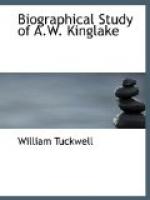Kinglake was strongly attracted by W. E. Forster, a “rough diamond,” spoken of at one time as a possible Prime Minister. Beginning life, he said, as a Quaker, with narrow opinions, his vigour of character and brain-power shook them off. Powerful, robust, and perfectly honest, yet his honesty inflicted on him a doubleness of view which caused him to be described as engaging his two hands in two different pursuits. His estimate of Sir R. Morier would have gladdened Jowett’s heart; he loved him as a private friend; eulogized his public qualities; rejoiced over his appointment as Ambassador at St. Petersburg, seeing in him a diplomatist with not only a keen intellect and large views, but vibrating with the warmth, animation, friendliness, that are charmingly un-diplomatic. Of Carlyle, his life-long, though not always congenial intimate, he used to speak as having great graphic power, but being essentially a humourist; a man who, with those he could trust, never pretended to be in earnest, but used to roar with glorious laughter over the fun of his own jeremiads; “so far from being a prophet he is a bad Scotch joker, and knows himself to be a wind-bag.” He blamed Froude’s revelations of Carlyle in “The Reminiscences,” as injurious and offensive. Froude himself he often likened to Carlyle; the thoughts of both, he said, ran in the same direction, but of the two, Froude was by far the more intellectual man.
Staunch friend to the few, polite, though never effusive, to the many, he also nourished strong antipathies. The appearance in Madame Novikoff’s rooms of a certain Scotch bishop invariably drove him out of them, “Peter Paul, Bishop of Claridge’s,” he called him. To Von Beust (the Austrian Chancellor), who spoke English in a rapid half-intelligible falsetto, he gave the name of Mirliton (penny trumpet). His allusions to Mirliton and to the Bishop frequently mystified Madame Novikoff’s guests. For he loved to talk in cypher. Canon Warburton, kindly searching on my behalf his brother Eliot’s journals, tells me that he and Kinglake, meeting almost daily, lived in a cryptic world of jokes, confidences, colloquialisms, inexplicable to all but their two selves.
He cordially disliked “The Times” newspaper, alleging instances of the unfairness with which its columns had been used to spite and injure persons who had offended it, chuckling over Hayward’s compact anathema,—“‘The Times,’ which as usual of late supplied its lack of argument and proof by assumption, misrepresentation, and personality.” He thought that its attacks upon himself had helped his popularity. “One of the main causes,” he said in 1875, “of the interest which people here were good enough to take in my book was the fight between ‘The Times’ and me. In 1863 it raged, in 1867 it was renewed with great violence, and now I suppose the flame kindles once more, though probably with diminished strength. In 1863 the storm of opinion generally waxed fierce against me,




